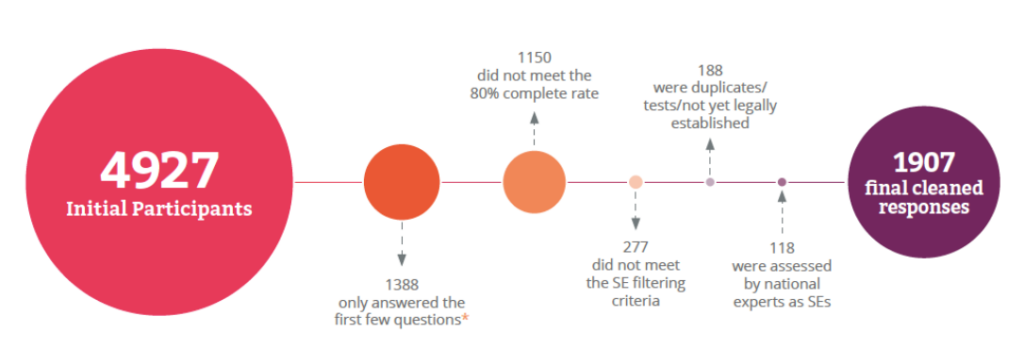The survey for the 2022 ESEM study was launched on 28 September 2021 by European Network for Social Enterprises (Euclid) – EN simultaneously in 21 European countries through an online platform. The survey was officially closed in February 2022.
To ensure methodological consistency and enable the benchmarking of results across 21 countries, the ESEM consortium has agreed on common criteria for the definition of SEs. When social impact is declared to be more important or equally important to financial interests when making strategic business decisions by respondents, it is accepted as an SE. This decision is based on the European Commission’s SE definition that reads as
A social enterprise is an operator in the social economy whose main objective is to have a social and environmental impact rather than make a profit for their owners or shareholders
In addition, some additional SEs are included who, according to their legal entity or other country-specific reasons, are considered an SE by the ESEM country partners, as national experts on SE within their respective contexts.
The survey contained around 150 questions including conditional questions and some country-specific ones. It took around 20-30 minutes on average for an SE to respond to the survey in Türkiye. Türkiye country survey was translated into Turkish, disseminated and analysed by Türkiye Social Entrepreneurship Network (TSEN). Türkiye generated the third greatest number of responses throughout the 21 European countries for the ESEM survey.
The findings of the Türkiye survey is presented in a comparative (Türkiye and Europe) and interactive dashboard with filtering options (i.e. institutional age, legal forms, stage of development and sector) for Türkiye data to provide further insights for policy-makers, investors, support organisations, academia and social entrepreneurs themselves.

ESEM Europe
In the Europe-wide survey a total of 4792 participants started the survey but 3003 of them were excluded in the analysis due to 80% threshold for survey completion, duplicates and survey’s key filtering criterion which is ranking the importance of social impact higher than financial interests/return in their strategic business decisions as it doesn’t fit SE definition of the study. Then 118 of these excluded responses were assessed as SEs by national experts and included to the data set again. Other standard data cleaning steps were taken in collaboration between the EN research team and country partners to check the consistency and formatting of answers. The team replaced missing answer entries with ‘N/A’ (no answer) and recoded where possible answers of ‘other’ which had accompanying text that could be classified within existing answer categories.
After the data cleaning process, 1907 cleaned responses were included in the analysis. It should be noted that the countries having less than 30 responses (Ireland, Serbia, Slovenia and the United Kingdom) have been excluded from any cross-country comparisons.
Caveats
Although the survey is designed by a group of experts in research and social entrepreneurship and meticulously implemented by TSEN, there are some caveats coming from social entrepreneurship being a developing sector and the nature of the online survey method.
Since there is no legal status for social enterprises in Türkiye, the representation of social enterprises might be biassed towards including the social enterprises that are already in the existing databases of TSEN. To decrease this bias the database was developed through a comprehensive desk research and involvement of local actors.
As social entrepreneurship is a developing sector in Türkiye, there is a lack of common language and understanding of the fundamental concepts and online implementation might also affect the relevancy of the answers.
The design of the survey including approximately 150 questions taking 20-30 minutes on average might be tough to manage for participants with low digital literacy. Translation of the survey by country partners to their own languages and socio-cultural structures might also have an effect on the findings.
Finally, it should be noted that findings of this survey only represent the status of the social entrepreneurship ecosystem at a specific timeframe. Since social entrepreneurship is still developing and macro-economic indicators are changing very rapidly the data presented here will only be valid for a short period of time; however, the findings will continue to be valuable as they serve as benchmark points with the previous studies and European ecosystem.

